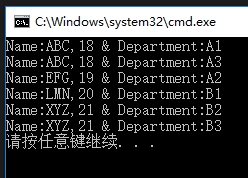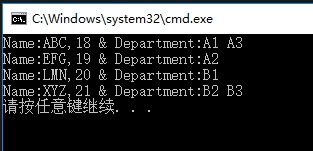这篇文章主要为大家展示了“C#中如何使用Join与GroupJoin将两个集合进行关联与分组”,内容简而易懂,条理清晰,希望能够帮助大家解决疑惑,下面让小编带领大家一起研究并学习一下“C#中如何使用Join与GroupJoin将两个集合进行关联与分组”这篇文章吧。
对于Join的用法说明如下:
语法:
public static IEnumerable<TResult> Join<TOuter, TInner, TKey, TResult>( this IEnumerable<TOuter> outer, IEnumerable<TInner> inner, Func<TOuter, TKey> outerKeySelector, Func<TInner, TKey> innerKeySelector, Func<TOuter, TInner, TResult> resultSelector )
参数说明:
outer Type: System.Collections.Generic.IEnumerable<TOuter> 要联接的第一个序列。 inner Type: System.Collections.Generic.IEnumerable<TInner> 要与第一个序列联接的序列。 outerKeySelector Type: System.Func<TOuter, TKey> 用于从第一个序列的每个元素提取联接键的函数。 innerKeySelector Type: System.Func<TInner, TKey> 用于从第二个序列的每个元素提取联接键的函数。 resultSelector Type: System.Func<TOuter, TInner, TResult> 用于从两个匹配元素创建结果元素的函数。 返回值 Type: System.Collections.Generic.IEnumerable<TResult> IEnumerable<T> ,其类型的元素 TResult 通过对两个序列执行内部联接获得的。
参数类型:
TOuter 第一个序列中的元素的类型。 TInner 第二个序列中的元素的类型。 TKey 键选择器函数返回的键的类型。 TResult 结果元素的类型。
参考链接如下:
https://msdn.microsoft.com/zh-cn/library/bb534675.aspx
https://docs.microsoft.com/zh-cn/dotnet/api/system.linq.enumerable.join?f1url=https%3A%2F%2Fmsdn.microsoft.com%2Fquery%2Fdev15.query%3FappId%3DDev15IDEF1%26l%3DZH-CN%26k%3Dk(System.Linq.Enumerable.Join%60%604);k(TargetFrameworkMoniker-.NETFramework,Version%3Dv4.0);k(DevLang-csharp)%26rd%3Dtrue&view=netframework-4.7.1
例程:
using System;
using System.Collections.Generic;
using System.Linq;
namespace ConsoleApp33
{
class Program
{
static void Main(string[] args)
{
GroupJoinEx();
}
static void GroupJoinEx()
{
Person p1 = new Person() { Name = "ABC", Age = 18 };
Person p2 = new Person() { Name = "EFG", Age = 19 };
Person p3 = new Person() { Name = "LMN", Age = 20 };
Person p4 = new Person() { Name = "XYZ", Age = 21 };
List<Person> pList = new List<Person> { p1, p2, p3, p4 };
Department d1 = new Department() { Name = "A1", Employee = p1 };
Department d2 = new Department() { Name = "A2", Employee = p2 };
Department d3 = new Department() { Name = "A3", Employee = p1 };
Department d4 = new Department() { Name = "B1", Employee = p3 };
Department d5 = new Department() { Name = "B2", Employee = p4 };
Department d6 = new Department() { Name = "B3", Employee = p4 };
List<Department> dList = new List<Department> { d1, d2, d3, d4, d5, d6 };
var result = pList.Join(dList,
person => person,
department => department.Employee,
(person, department) => new
{
Person = person,
Department = department
});
foreach(var item1 in result)
{
Console.Write($"Name:{item1.Person} & Department:{item1.Department} ");
Console.WriteLine();
}
}
}
class Person
{
public string Name { set; get; }
public int Age { set; get; }
public override string ToString()
{
return $"{Name},{Age}";
}
}
class Department
{
public string Name { set; get; }
public Person Employee { set; get; }
public override string ToString()
{
return $"{Name}";
}
}
}输出结果:

对于GroupJoin的用法说明如下:
语法:
public static IEnumerable<TResult> GroupJoin<TOuter, TInner, TKey, TResult>( this IEnumerable<TOuter> outer, IEnumerable<TInner> inner, Func<TOuter, TKey> outerKeySelector, Func<TInner, TKey> innerKeySelector, Func<TOuter, IEnumerable<TInner>, TResult> resultSelector )
参数说明:
outer Type: System.Collections.Generic.IEnumerable<TOuter>
要联接的第一个序列。
inner Type: System.Collections.Generic.IEnumerable<TInner>
要与第一个序列联接的序列。
outerKeySelector Type: System.Func<TOuter, TKey>
用于从第一个序列的每个元素提取联接键的函数。
innerKeySelector Type: System.Func<TInner, TKey>
用于从第二个序列的每个元素提取联接键的函数。
resultSelector Type: System.Func<TOuter, IEnumerable<TInner>, TResult>
用于从第一个序列的元素和第二个序列的匹配元素集合中创建结果元素的函数。
返回值
Type: System.Collections.Generic.IEnumerable<TResult> IEnumerable<T> ,其中包含类型的元素 TResult 通过对两个序列执行分组的联接获得的。
参数类型:
TOuter 第一个序列中的元素的类型。 TInner 第二个序列中的元素的类型。 TKey 键选择器函数返回的键的类型。 TResult 结果元素的类型。
参考链接如下:
https://msdn.microsoft.com/zh-cn/library/bb534297.aspx
https://docs.microsoft.com/zh-cn/dotnet/api/system.linq.enumerable.groupjoin?f1url=https%3A%2F%2Fmsdn.microsoft.com%2Fquery%2Fdev15.query%3FappId%3DDev15IDEF1%26l%3DZH-CN%26k%3Dk(System.Linq.Enumerable.GroupJoin%60%604);k(TargetFrameworkMoniker-.NETFramework,Version%3Dv4.0);k(DevLang-csharp)%26rd%3Dtrue&view=netframework-4.7.1
例程:
using System;
using System.Collections.Generic;
using System.Linq;
namespace ConsoleApp33
{
class Program
{
static void Main(string[] args)
{
GroupJoinEx();
}
static void GroupJoinEx()
{
Person p1 = new Person() { Name = "ABC", Age = 18 };
Person p2 = new Person() { Name = "EFG", Age = 19 };
Person p3 = new Person() { Name = "LMN", Age = 20 };
Person p4 = new Person() { Name = "XYZ", Age = 21 };
List<Person> pList = new List<Person> { p1, p2, p3, p4 };
Department d1 = new Department() { Name = "A1", Employee = p1 };
Department d2 = new Department() { Name = "A2", Employee = p2 };
Department d3 = new Department() { Name = "A3", Employee = p1 };
Department d4 = new Department() { Name = "B1", Employee = p3 };
Department d5 = new Department() { Name = "B2", Employee = p4 };
Department d6 = new Department() { Name = "B3", Employee = p4 };
List<Department> dList = new List<Department> { d1, d2, d3, d4, d5, d6 };
var result = pList.GroupJoin(dList,
person => person,
department => department.Employee,
(person, departments) => new
{
Person = person,
Department = departments.Select(d => d)
});
foreach(var item1 in result)
{
Console.Write($"Name:{item1.Person} & ");
foreach(var item2 in item1.Department)
{
if(item1.Department.First() == item2)
Console.Write($"Department:{item2} ");
else
Console.Write($"{item2} ");
}
Console.WriteLine();
}
}
}
class Person
{
public string Name { set; get; }
public int Age { set; get; }
public override string ToString()
{
return $"{Name},{Age}";
}
}
class Department
{
public string Name { set; get; }
public Person Employee { set; get; }
public override string ToString()
{
return $"{Name}";
}
}
}输出结果:

以上是“C#中如何使用Join与GroupJoin将两个集合进行关联与分组”这篇文章的所有内容,感谢各位的阅读!相信大家都有了一定的了解,希望分享的内容对大家有所帮助,如果还想学习更多知识,欢迎关注亿速云行业资讯频道!
免责声明:本站发布的内容(图片、视频和文字)以原创、转载和分享为主,文章观点不代表本网站立场,如果涉及侵权请联系站长邮箱:is@yisu.com进行举报,并提供相关证据,一经查实,将立刻删除涉嫌侵权内容。